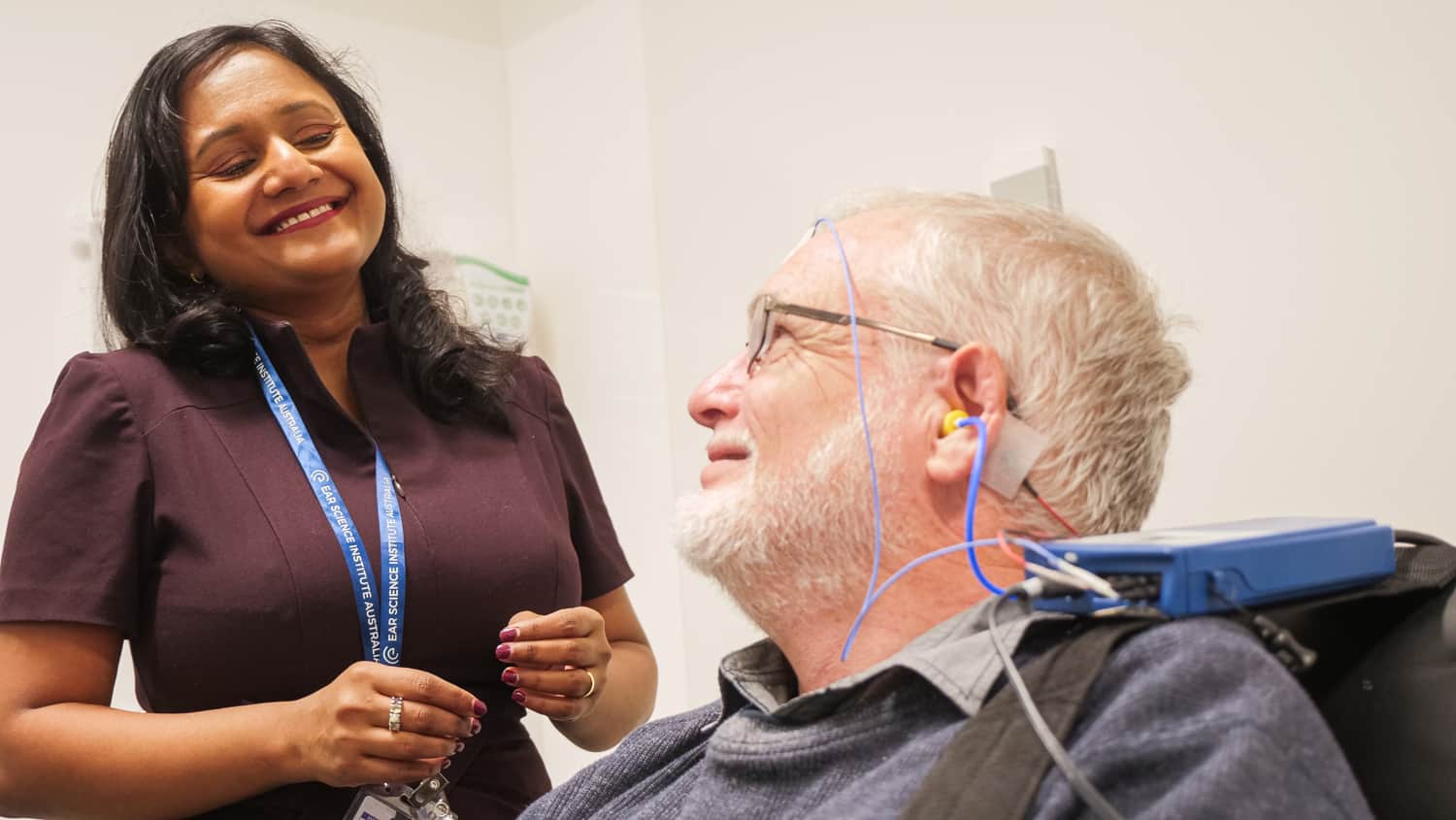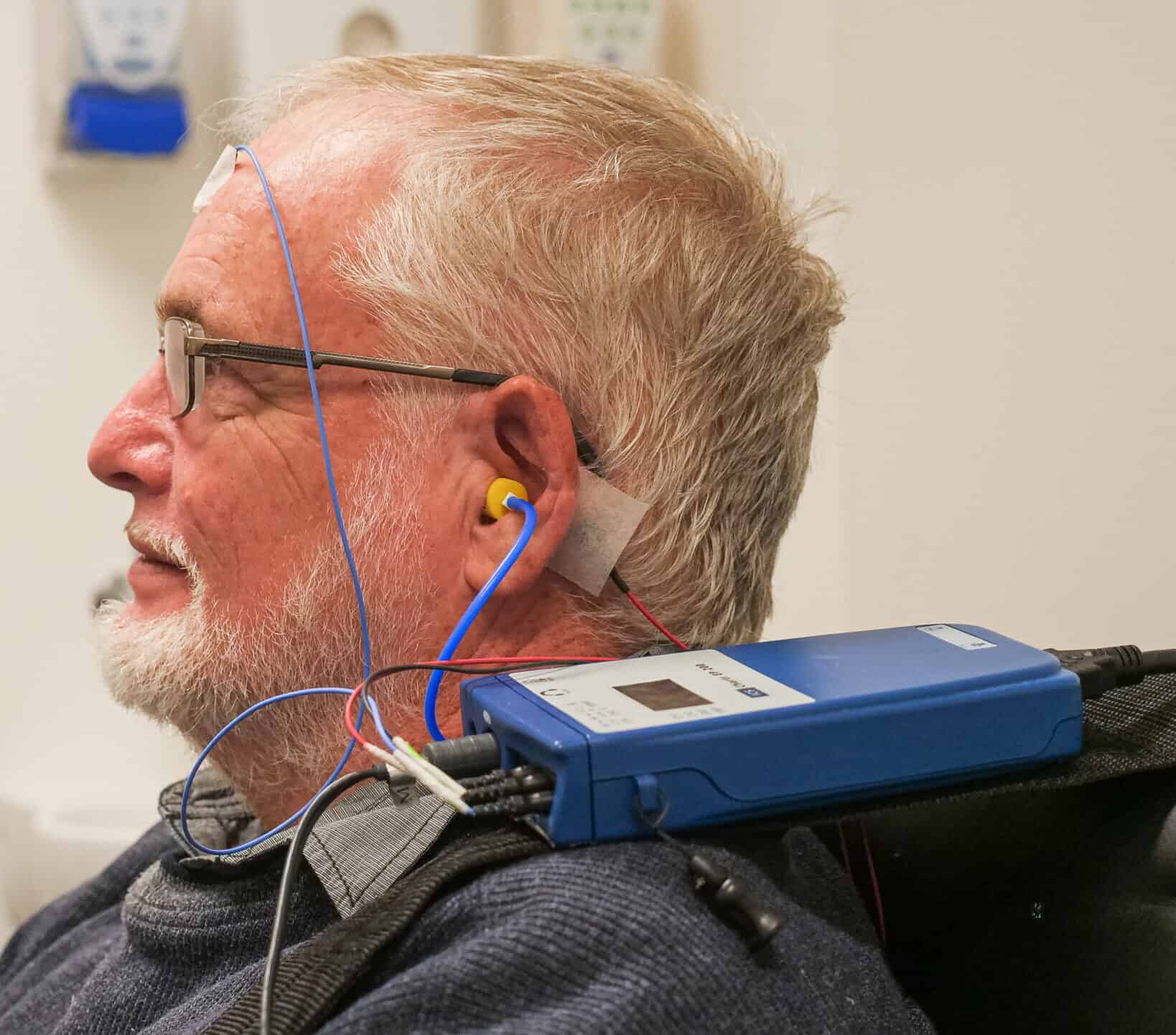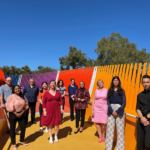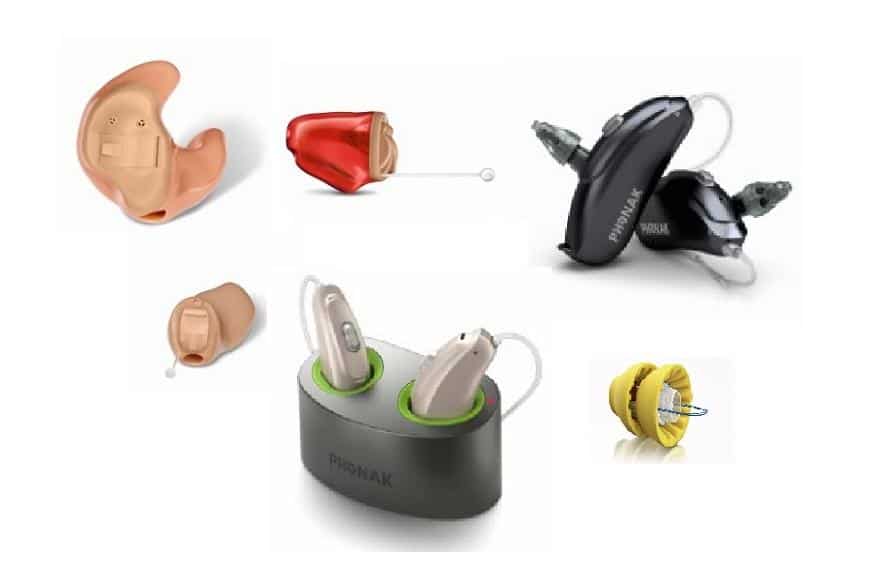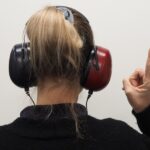In this episode, Dr Dona Jayakody will share how and why Hearing Loss contributes to cognitive decline, and how we can reduce the risk of dementia as we all get older.
Dan Van Der Meer: [00:02] This is The Ear Science Podcast, The Science of Healthy Hearing.
Lize Coetzee: [00:09] Hello and welcome to The Ear Science Podcast, The Science of Healthy Hearing. Proudly presented by Ear Science Institute Australia, a not-for-profit medical research institute. In this podcast we’ll bring you into our world, the world of ear and hearing science. Together with Dr. Dona Jayakody, we will discuss the latest in ear and hearing research and what it means to you.
Dan: [00:33] I’m Dan Van Der Meer, digital content specialist, and podcast host and passionate about raising awareness for the impact of hearing loss.
Lize: [00:41] And I’m Lize Coetzee, qualified audiologist and the Chief Operating Officer at Ear Science Institute Australia.
Dan: [00:47] This podcast provides information of a general nature and does not constitute medical advice.
Lize: [00:52] Today, we are talking to Dona Jayakody. Dona has a PhD in audiology and has published world-leading research showing the link between hearing loss and cognitive decline. Dona, welcome to The Ear Science Podcast, The Science of Healthy Hearing.
Dona Jayakody: [01:08] Thank you for having me.
Lize: [01:09] Thanks Dona. The term cognitive decline sounds a bit frightening. What does it mean and how’s this really linked to hearing loss?
Dona: [01:19] So, many old adults worry about their memory and other thinking abilities, for example, you know, they might be concerned about that taking a lot of time to remember things or learn new skills or, you know, some once in a while they might forget someone’s name. So that’s okay. That’s all part of the normal ageing process.
Lize: [01:37] So losing our keys are okay.
Dona: [01:39] Once in a while is okay.
Lize: [01:40] Okay. Thank you.
Dona: [01:42] But when these memory issues become serious and start affecting the daily living activities, that’s when it becomes a problem like such as like driving or using the phone or like, finding your way home or where you leave something on the stove and you forget that it’s in there. So, when these memories issues start to affecting your daily living activities, that’s where we need to be very concerned. So talking about the association between hearing loss and dementia. So when someone has a hearing problem, you have to always keep on filling the gaps and that over time becomes very tiring and increases the listening effort. So the work we have done at Ear Science Institute Australia, we’ve found that untreated hearing loss is associated with increased risk of depression, anxiety, and stress. And also when someone has a hearing problem, they avoid social situations. They won’t go out to their friends, they won’t pick up the phone. So even if they’re surrounded by a lot of loving and caring family members and friends, the inability to communicate effectively makes them feel lonely and isolated. So together, all these factors increases the risk of cognitive impairment and dementia.
Lize: [03:02] Wow, Dona. You know, so it’s not just the hearing loss and we know one in six people have hearing loss, but it’s that impact that that hearing loss has on people’s lives. And that’s amazing the research that you’re currently doing.
Dan: [03:14] Dona, I’m a young spritely, 48 years of age, I don’t need to worry about dementia yet. Surely it only happens when I get old. Is that right?
Dona: [03:23] Not really.
Dan: [03:25] I didn’t think so.
Dona: [03:26]: So, there is a very small percentage of people, we call them young onset dementia, that happens usually before the age of 65 years. However, the Australian research show that the changes in the brain, the pathological changes in the brain, take place many, many years before the clinical symptoms start appearing. So, whatever you do in your midlife has an impact on whatever happens in your late life. So, some something like untreated hearing loss or hypertension. And we also see that in our clinic and also our data show that people usually wait about like seven to eight years before they’re seeking help for untreated hearing loss.
Dan: [04:07 So they have seven or eight years of this kind of symptoms without doing anything about it, on average?
Dona: [04:12] Yes. They just wait on, you know, it’s not that serious. I can wait. So that’s why it’s really important to seek help as long as start noticing signs of a hearing problem rather than waiting.
Lize: [04:23] Dona, as an audiologist, what I often say to my clients that sort of come in and go, “oh, I probably don’t have to have a hearing test, I’m just yet, you know, bringing my mom,” is say, don’t wait till your teeth are rotten to go to the dentist and we don’t wait till we can’t see anything until we go to an optometrist. We need to normalize getting our hearing tested, and that’s not in old age, but that is just something you do every year. You get your eyes tested, you go to the dentist, you go and see your audiologist. It needs to form part of that. Just that normal medical care that you do for yourself.
Dona: [04:56] Absolutely.
Lize: [04:58] Dona, we know hearing loss is a risk factor for dementia, are hearing aids and cochlear implants are an effective treatment to stave off dementia. And what is the research currently saying?
Dona: [05:09] So, we have done a lot of, um, research in this area. One of the studies, we looked at the impact of cochlear implants using cochlear implants on cognitive functions and in that study, we saw that cochlear implant recipients, the rate of decline in their memory skills were slower and less compared to those who did not get a cochlear implant. Same we have seen for the hearing aid users as well. So based on these findings, we just designed a large randomized control trial to investigate whether we can delay or arrest dementia by treating hearing loss.
Dan: [05:50] Right. Yeah. And Dona, I understand you’ve been leading a study looking at whether treating hearing loss can delay or stave off the onset of dementia. Is there anything you can share with us about how that study is progressing and what the outcomes may be?
Dona: [06:03] I’m very excited about this study and we are still in the process of participant recruitment. So, it’s gonna take a bit more time for us to in officially analyze the results and see what’s going on. However, in the clinic every day, what I see with the people who are being fitted with hearing aids, they say that, “oh, you know, this changed my life and I’m now very confident to go out, I don’t feel lonely anymore.” And they starting listening to music again and going out. So, we see these treating hearing loss seem to have a huge impact on the quality of life. So that’s a positive for me.
Dan: [06:42] Absolutely. 100%.
Lize: [06:44] So, Donna, it’s so exciting to, to hear about those early findings that you are able to share with us, but can I just take us sort of a few seconds back what you were saying you’re doing a randomized control study. Can you just delve into that a little bit more? What is the study called? What are you doing and is it something that’s unique or being done other places as well?
Dona: [07:10] So, when it comes to research, randomized control trials are the gold standard. That’s where we get the best evidence. So, the study is called adhere cog trials. So, what we are trying to do in this study is recruit people who are at risk of dementia, who are at the stage of, we call it mild cognitive impairment. And they also have untreated hearing loss. They have never used hearing aids before. So, we are first when they come in, we ask them to go through a screening process to identify that they may meet the study criteria. And then what we do is we ask them to go through a set of assessments. We look at their hearing, their psychological wellbeing, their frailty, their mental wellbeing, and their general quality of life, their daily living activities, and their cognitive functions. Then we follow them up every six months for a period of two years. So, 50% of the people get fitted with hearing aids immediately after the first assessment. The randomly chosen, the remaining 50% get fitted with hearing aids a year later. And we also try to see what changes do take place in the brain. So, we do have MRI scan and FDG pet scan. So, we see what changes do take place in the brain as a result of getting a hearing aid and going through a hearing loss treatment. So, and then we also want to see when we treat hearing loss, it has a huge impact on the economy. And so, we are doing a health economic analysis to see the impact of the study on the Australian economy. So overall we are looking at what’s really happening when we treat the hearing loss.
Lize: [08:54] That is so powerful Dona. It’s really gonna change how we hopefully stave off dementia.
Dona: [09:00] Absolutely.
Lize: [09:01] And really have a big impact for people with hearing loss.
Dona: [09:03] Absolutely.
Dan: [09:04] That’s so interesting. For those of us with loved ones, Dona, who may be experiencing dementia, is treating hearing loss still helpful?
Dona: [09:11] Absolutely. So first of all, treating hearing loss is about helping people communicate effectively. You need to communicate with your carers, your loved ones. And, so that’s really important. The second answer to your question is that research has shown that, listening to familiar melodies, music, and improve behaviour and mood, and sometimes cognitive functions in those who are with dementia, and also reduces the caregiver burden. So, listening to music can elicit pleasurable emotions and responses such as moving or dancing or even when the communication is lost. So, in order to benefit from music, music therapy, you need to be able to hear that.
Dan: [10:02] Yeah. How fantastic. Yeah.
Lize: [10:04] And as an audiologist for me, just to add to that, Dona as well, is it’s not only hearing aids that we have available for people with dementia because that can sometimes be hard to manage especially when there is not a carer there all the time. There are a lot of other products that we can fit that makes that listening just so much easier. So, I think some people can feel, “oh, well, we can’t do hearing aids. It’s just too much to manage.” There are many other options so important to speak to an audiologist that has that sort of breadth of services and products available to get something that can really work.
Dona: [10:42] Absolutely.
Lize: [10:43] Dona, it’s so interesting to hear that you including scans like MRI and pet scan into this research, can you tell me what you are trying to see with this?
Dona: [10:55] So, with MRI scans, what we are trying to see is changes in the neural pathways of the brain. So, you know, when someone has a hearing problem and if it is untreated, there are changes take place in the brain, especially in the auditory cortical areas, we call them reorganization or topical reorganisation. So, the areas that respond to certain sounds no longer start responding to them. So, what we are trying to say is that by treating hearing loss, whether we are gonna see any changes in the neural pathways, that’s what we are gonna see with the MRI. So, the FDG pet is a scan which we measure the metabolic activities of the brain. So again, we are kind of trying to see what are the metabolic activities when we see when someone has a hearing problem and what changes do we see in these patterns after we treat someone with a hearing problem.
Lize: [11:50] Dona, I know you recently started a study looking at the higher rates of dementia with an Aboriginal older adults compared to the general Australian population. Why is this research so important?
Dona: [12:04] So, there are several reasons for it. So indigenous old adults, they exhibit dementia three to five times higher than the general Australian population. And then when we look at the statistics about hearing loss, about 82% of the indigenous old adults, about the age of 55, do have a hearing loss in one year or the other 82%. So, these statistics are, these numbers are much higher in indigenous older adults compared to general Australian population. So, and then if you look at the indigenous culture, song and dance, storytelling, are very, very important aspects. And how these skills are being transferred to the next generation by elders, through you know, through the oral communication. Storytelling and the same song and dance. So, if someone has a hearing problem that impacts not only their communication, that has a huge impact on their culture as well. So, we are doing number of projects in this area in collaboration with WA Center for Health and Ageing and also for hearing Australia and also for university of Western Australia. So, we are trying to see a number of effects. First we are trying to see what is the impact upon treated hearing loss on cognitive functions, mental wellbeing, psychosocial wellbeing, and general quality of life, and also in indigenous old adults. And we know that there are barriers for them to seek treatment. So, the second study looking at what are the barriers for these treatments and for seeking treatment. Third, we are also trying to see if we overcome these barriers and treat hearing loss, what impact we are going to see. So, this is really, really important area of research for us. And I’m very excited and really looking forward to working on it.
Dan: [14:06] And life-changing for a whole bunch of people. So that’s just amazing. Yeah.
Lize: [14:10] Dona, when we’re with clients, we often use or reference the Lancet study where it says hearing loss is the biggest, what you call modifiable risk for dementia. So, it’s the one thing that we can change or reduce our chance of getting dementia. Is this research, because I know it’s groundbreaking research, that really sort of started your research and looking at the link between hearing loss symptom dementia?
Dona: [14:38] So, we started our work in 2015 and then the first review we did, we proposed a model and we looked at it and we said, untreated hearing loss, is associated with cognitive impairment, social isolation, loneliness, and mental wellbeing. And based on this model, we first designed our Australian cognition and hearing loss projects. That’s where all our pilot test work results came from. We looked at the untreated hearing loss and nonverbal cognitive impairment because you know, if someone has a hearing problem and if you conduct a cognitive test, which requires for you to listen and repeat and do things and you may not be able to do that, and then that often mislead to someone having cognitive impairment. But in reality, what happened is they couldn’t hear. So, we really identified the importance of using non-verbal cognitive assessments when we are treating people with looking at the cognitive functions of those who have a hearing problem. So, we published all this work and then we looked at the impact of untreated hearing loss on mental wellbeing, psychosocial wellbeing, and then the next logical question for us to ask is what if we treat the hearing loss? That’s where we published our first paper on using the cochlear implants as a hearing loss treatment and what happens to cognitive functions. And then we looked at the hearing aids and that’s where we designed the randomized control trial. So Lancet findings really strengthen the work that we do and then kind of, you know, made everyone be aware, and the world be more and more aware of it. But we kind of have to, we have been in this journey for many, many years.
Lize: [16:26] And Dona, I’d just like to pick up on one of those points that you said, the way that hear cog is testing people with hearing loss, cognitive function is a not a verbal test.
Dona: [16:39] No, we are using non-verbal assessment.
Lize: [16:42] So that really gives you a better indication.
Dona: [16:44] Absolutely.
(crosstalk)
Lize: [16:44] Does that person have cognitive decline and you sort of take that hearing loss out of the picture when you’re measuring their cognitive ability?
Dona: [16:52] Absolutely. And I also want to insist on the fact that if your loved ones, if you do think that you do have a hearing problem if you go to your GP or anywhere and getting a cognitive screening or cognitive assessment done, it’s really important that that you are being tested or assessed using validated tools for hearing loss.
Dan: [17:15] Yep. So, Dona, it must be extremely rewarding for you and your team who do such great work to read some of the testimonials that we get that as a benefit of the work you’re doing, do you gather around and look at the computer and high five each other, or what happens? Because it must be so rewarding as what you do day to day to make such a difference in people’s lives.
Dona: [17:41] So when we see, you know, people are coming up and just saying things like, you know, “I love my hearing aids. I feel like my life has gotten so much larger.” Or sometimes people say, “I was unable to join in when going to cafes. Now I feel like I’m part of the social work again.” And these things make us like, feel that all the efforts that we put in to do this research is really worth it. And you know, it gives us so much joy.
Dan: [18:08] Yeah. How many in your team? Generally speaking.
Dona: [18:12] So, we do have large collaborators and internally I do have, we collaborate with Lions Hearing Clinics and the qualified audiologists do all our hearing assessments for our participants. And I’m extremely grateful to each and every one of them without their support, none of this work would have been possible.
Dan: [18:33] Fantastic.
Lize: [18:34] Dona, this is really fascinating. And with a number of people at risk of developing dementia, the research you are doing is making us so much more hopeful. So, thank you very much. Just to finish off, what are three takeaways that you can send our listeners off with?
Dona: [18:52] I would first say that treating hearing loss has huge health benefits, not for you, but also for your loved ones and also for the community. So, if you see early signs of hearing loss, don’t delay it, seek treatment. And also, it’s very personal to me. And I also say, be kind and empathetic towards everyone. And that’s really important. We are in this together. And the work that we do is for everyone, just, I always say, it’s not to leave anyone behind. So, we are a team. We are a community and it’s our job to help and support each other.
Dan: [19:36] Dona, thank you so much for joining us today.
Lize: [19:38] Thank you, Dona.
Dona: [19:39] Thank you honour for having me
Male speaker: [19:40] Right now. We are seeing our loved ones less, all thanks to COVID. And people with untreated hearing loss are really struggling to stay connected. We all know that to live well, you need to hear well. Maybe it’s you or maybe you have a loved one that needs support for untreated hearing loss. There is help available. Start today. Search Lions Hearing Clinic to find out how simple it is for yourself or your loved one to get a hearing check. Try our free online hearing check or reach out to our Hearing & Tinnitus Advice Line and speak to someone about your hearing needs.
Dan: [20:14] If you’ve enjoyed this episode, let us know by rating and reviewing this podcast or sharing it with a friend or family member. Make sure you’ve subscribed so you don’t miss an episode. Next time we will talk to Ronel Chester-Browne, an audiologist specializing in cochlear implants. Once considered a rare and radical intervention, you might be surprised to hear how common these are becoming and how they are helping change the lives of people experiencing hearing loss.
Female speaker: [20:37] If you find that you’re struggling with hearing aids in any challenging listening environment noise, when a person’s not facing you, on the telephone, or even hearing the television, a cochlear implant might just be what you need.
Dan: [20:52]
To view this episode with captions, visit the Ear Science YouTube channel or our website www.earscience.org.au/podcasts.
To suggest a topic for a future episode, links to more information and research papers on this topic visit our website www.earscience.org.au/podcast.
The producer of the Ear Science Podcast, the science of healthy hearing, is Emma Ireland with sound engineering and editing by myself Daniel Dan van der Meer.
We acknowledge the original custodians of the land we are producing this podcast on, the Whadjuk people of the Noongar Nation and the land on which you’re listening from. We pay respect to the Noongar elders past, present and emerging.

